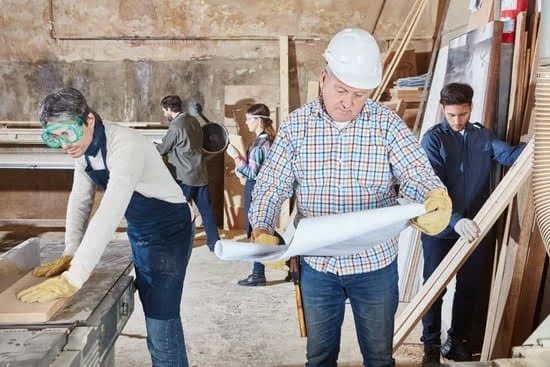Introduction
Woodworking is a creative and unique craft that has been around for centuries. Throughout history, woodworkers have produced stunning pieces of art and furniture, from elaborate cabinets to intricately-carved statues. However, to become a successful woodworker today, knowledge and experience are key components.
Education – To become a woodworker in today’s world, obtaining the proper education is essential. A range of options are available from trade schools, technical colleges and community colleges that provide in-depth knowledge of joinery methods, fabrication techniques and more. Additionally, many larger universities offer degrees in fields such as carpentry or cabinetmaking which can also provide valuable insights into the craftsmanship behind professional woodworking works. Furthermore, some employment opportunities may require a degree or certification in order to obtain specific licenses or be accepted for certain kinds of work which a formal education can provide training for.
Experience – Besides having an education related to the field of woodworking profession, embarking on projects in hands-on experience is very valuable when it comes to mastering the craft. Learning by doing can help one better understand how different processes work together to achieve a desired result as well as illustrate what works best for each individual situation. Taking on projects with real-life applications also affords valuable learning experiences beyond what can be gained from theoretical knowledge gained from books or through lectures or discussions in school settings.. This can be achieved through job shadowing experienced woodworkers taking on apprenticeships with companies or working as part of hobby groups that specialize in crafting items such as furniture building objects working with homeowners thinking up solutions to their repair problems while volunteering at local non-profits that involve carpentry projects etc.. It can also help individuals hone their skills at home if they decide to tackle DIY projects like making furniture building bird houses putting together trellises crafting shelves etc .
In general gaining the education and necessary experience that comes with studying and constructing various woodworking projects using valid industry approved methods will stand professionals in better positions so they are able put their best foot forward when presenting their services either to employers individual clients businesses or organizations etc
What Are the Educational Requirements for Woodworkers?
Woodworking requires knowledge of building, construction and furniture-making. To become a skilled woodworker, formal education is required, although exact requirements and levels may vary according to the specific job. Some people learn while working as an apprentice with a more experienced woodworker; other choose to complete a program at a professional school or technical college specializing in woodworking, cabinetry or furniture making. These programs often combine classroom education with hands-on learning and offer classes in drawing, design, woodworking theory, materials usage and safety procedures.
At minimum, an associate’s degree from an accredited program is usually necessary for jobseekers looking to pursue careers in woodworking and furniture-making. Employers also value certifications such as those offered by the National Wood Flooring Association (NWFA), Cabinet Maker’s Association (CMA), Architectural Woodwork Manufacturers Association (AWMAC) or related organizations in the cabinetmaking industry. In addition to formal qualifications, prospective employers may consider experience gained through apprenticeships or on-site work when hiring prospective workers.
What Skills and Knowledge Must Woodworkers Have?
Woodworkers must have a variety of skills and knowledge in order to excel at their craft. This includes a wide range of technical and foundational knowledge, from woodworking tools selection and use, to joinery techniques and the characteristics of different types of wood. In some cases it is beneficial to have specific training related to the operation, maintenance, and repair of the major tools in a workshop. In other cases, an apprenticeship is desirable to gain insight into various furniture-making styles, finishing methods, and custom construction techniques. In addition to strong hand dexterity and manual skillset, an understanding of basic mathematics as well as computer aided design (CAD) is beneficial for planning projects accurately. Lastly, an appreciation for aesthetics allows a craftsman to consider his work from various angles before arriving at a sleek finish.
What Vocational and Trade Schools Offer Woodworking Courses?
Most vocational and trade schools offer courses in woodworking that can give you the knowledge and skills to make simple projects. These courses will teach you how to cut, shape, join, finish, and assemble wood items like furniture and other objects. You’ll learn about the various types of woods available in different species, as well as their characteristics and uses. Other topics may include building different types of cabinets, countertops, shelves and drawers; creating moldings; making jigs for table saws; using routers; using hand tools such as chisels, hammers and saws; gluing joints for strength; sanding finishes; building stairs; basic electricity in woodworking applications including sharpening drills or other cutting tools. In addition, many woodworking courses also cover tools design and solution-based ideas for problem-solving requirements in a variety of projects.
How Can Woodworkers Expand their Knowledge Through Online Resources?
Woodworkers may have professional experience or formal training in cabinetmaking, carpentry, painting, furniture finishing and other specific areas. They may also have an artistic eye that allows them to create beautiful pieces. Generally, woodworkers will enjoy working with their hands and be knowledgeable about many types of tools and techniques.
To expand their knowledge and become better woodworkers, there are a wide range of online resources available. Woodworking magazines feature step-by-step projects for beginners and experienced woodworkers alike. Online forums allow woodworkers to interact with one another and ask questions or share tips and tricks. Video tutorials provide visual demonstrations on various woodworking techniques from basic skills to complex crafting projects. Webinars, sponsored by companies or organizations, provide an opportunity for woodworkers to listen to experts talk about the technical aspects of their craft such as selecting lumber components or how to use power tools safely. Additionally, many colleges and universities offer courses in woodworking that can improve a student’s understanding of materials and design theory. Finally, local community classes can help equip new hobbyists with skills in milling lumber and creating joints as well as special topics like marquetry or turning items on a lathe.
What Are the Advantages of Professional Woodworking Education?
Woodworkers typically receive some kind of formal education, such as a Carpenter’s Apprenticeship or a degree from a technical school or college. A Carpenter’s Apprenticeship is often completed over a build period of 3 to 4 years, and grants the apprentice an in-depth knowledge of construction methods and techniques. Technical school courses are not as intensive but may still provide solid training, while college programs offer more detailed coursework covering everything from design concepts to marketing and business plans. With any of these avenues, woodworkers can come out of their program confident in their skills and knowledgeable about what it takes to run a successful business.
The advantages of professional woodworking education are numerous. Woodworkers can develop better workmanship skills through hands-on experience in the classroom setting and gain confidence in their areas of expertise that allows them to produce quality products at an increased rate. Also, the educational environment provides access to tools and equipment that apprentices may not otherwise be able to afford. Professional curriculums often include topics such as design theory, manual machine operations, sanding techniques, finish application methods, planning layout diagrams and cad plans which give aspiring professionals insight into different aspects they will need once they enter the job market. Additionally, experienced instructors usually provide guidance on legal matters related to bidding contracts or establishing a business entity, adding even further value to earned certifications or degrees.
Conclusion
Finding the right education in woodworking is crucially important to success in this field because of the highly technical and specialized nature of the tasks involved. Woodworkers need strong knowledge of the material, tools and processes used to create durable, long-lasting pieces that meet customer expectations. To achieve this goal, potential woodworkers should look into a combination of formal education classes or programs combined with apprenticeships providing hands-on experience as they learn from experienced professionals. A wide variety of courses are available related to carpentry, furniture making and cabinetry design which can help new woodworkers develop their skills in several different disciplines. Those interested in pursuing a career path in woodworking should carefully research the possibilities available before choosing a direction to pursue. With the proper combination of education and skills development anyone can enjoy a successful career making beautiful wooden items.

Hi everyone! I’m a woodworker and blogger, and this is my woodworking blog. In my blog, I share tips and tricks for woodworkers of all skill levels, as well as project ideas that you can try yourself.





